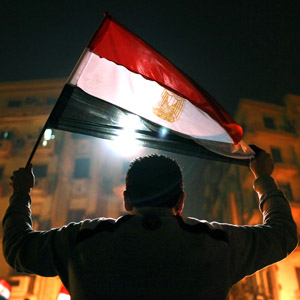By STEPHANIE GARCIA
 For the next six months, Egypt will be under military rule while transitioning into a democratic government.
For the next six months, Egypt will be under military rule while transitioning into a democratic government.
Since Egyptians began to protest their repressive government, headed by Hosni Mubarak, people around the world have been glued to their TV’s. For 18 days, Tahir Square was on fire while every inch of cement was covered with chanting protesters.
“It upset people that Mubarak was staging elections year after year. We overthrew a dictator after 30 years of power, and it didn’t take that long to do it,” junior Yousef Hassan said.
With his dad and extended family in Egypt, Hassan has followed the unfolding events taking place in the country. Younger members of his family who took part in the protests, recreated the happenings of the day for Hassan. They described riots being shut down by police and ongoing persistence of protesters.
“It’s difficult for a country to ensure a new government when they have no history of a democratic one. We supported Mubarak because we saw that having an unjust leader was better than having no government at all,” American History teacher Michael Dorman said.
Dorman says the nature of Egypt’s transition depends on how transparent the military is. If they don’t allow for a democratic government to be formed, Islamic fundamentalists will respond with a new batch of protests.
“This revolution was a long time coming, and it’s not going to be fixed in a couple of months. I know they’re aiming for democracy, but it’s going to take years at best for it to come together,” junior Heather Keeler said.
Growing protests have taken flight across the Middle East where similar riots and anti-government protests have taken place. Egyptian demonstrations and continued struggles to improve their government have influenced other Arab countries to do the same.
Tunisia and Egypt already have unseated governments, and Libya is close behind making strides toward removing their leader, Col. Muammmar el-Qaddafis, who has dragged the country into civil war. Iran is drawing courage from Egyptians as well, coming out after 2 years to challenge their regime.
However, while the political revolutions have brought freedom from corrupt rulers, they also brought a negative impact on the global market.Stock prices have plummeted and oil prices have risen as crude oil operation disruptions continue in Libya.
The stakes are higher now, because unlike Egypt, Libya is an Organization of the Petroleum Exporting Countries member and a significant oil producer, and continued disruptions will be bad news for consumers. According to the U.S. Energy Information Administration, oil and gas production in Libya have fallen by an estimated 60 to 90 percent since February.
Additionally, gold has climbed to above $1,400 an ounce, and silver passed its previous 30-year high of $32.86. Consequently, airlines like JetBlue and Delta have raised fares to make up for rising fuel costs.
Though the removal of corrupt leaders is celebrated globally , the extent of the impact remains unkown. Investors are afraid of prolonged damage on the global economy if unrest continues.